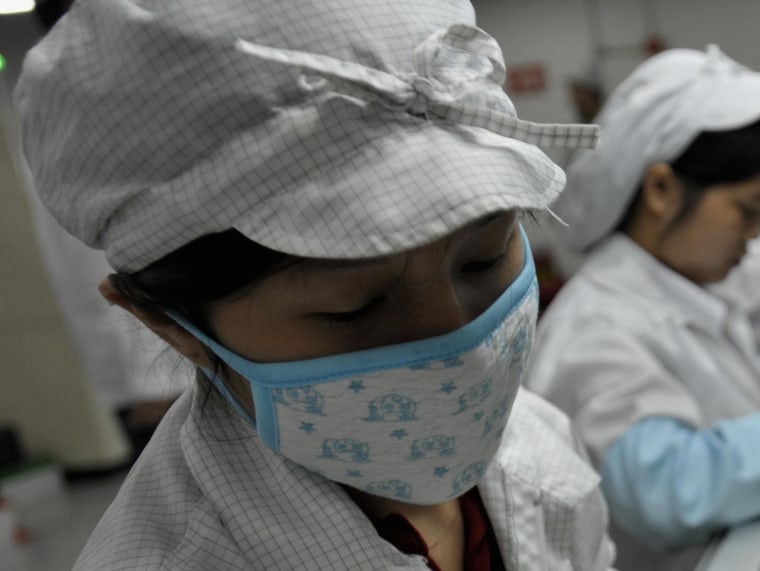Terry Gou says he has no idea why so many of his employees are killing themselves. Gou is the founder and chairman of Foxconn, the world's largest electronics contract manufacturer — the maker of iPhones and iPads for Apple, computers for Dell, and countless other devices for well-known high-tech customers around the world.
So far this year, 10 Foxconn workers have committed suicide. "From a logical, scientific standpoint, I don't have a grasp on that," Gou told reporters on May 27 at a press conference at the company's vast production facility in Shenzhen, China. "No matter how you force me, I don't know."
Ask around among the more than 250,000 workers at the Shenzhen complex, and you'll find explanations. One 21-year-old assembly-line worker, who asked that his name not be used, says conditions at Foxconn make his life seem meaningless. He says conversation on the production line is forbidden, bathroom breaks are kept to 10 minutes every two hours, and workers get yelled at frequently.
No one disputes that Taipei-based Foxconn, also known as Hon Hai, has cultivated a tough culture. The company generates more revenue in a year than Apple, Dell, or Microsoft. It has grown in profitable obscurity to become an industry juggernaut for a simple reason, says Pamela Gordon of Technology Forecasters, a supply-chain research firm: "It's the prices. Their prices are lower for high-quality work." Foxconn won Apple's order to make the iPhone after Gou directed the business units that make components to sell parts at zero profit, according to two people familiar with the chairman's actions. Net income jumped 37 percent in 2009 to $2.3 billion, Foxconn's second-best year on record.
Apple, Dell, and Hewlett-Packard have all announced intentions to look into Foxconn's working conditions. "We're all over this," Apple's Steve Jobs said at a tech conference on June 1. He called the suicides at Foxconn "very troubling." Apple, HP, and Dell declined to comment on specific actions they planned to take.
Gene Grabowski, who chairs the crisis and litigation practice at Levick Strategic Communications, says this could be a Nike moment for tech companies, referring to the public outcry in the early 1990s over working conditions at Asian shoe factories. He says one way to minimize any Foxconn-related PR trouble would be to follow the strategy of U.S. toymakers. In 2007, after their Chinese manufacturing partners were found to be allowing lead paint into products sold in the U.S., companies sent inspectors to watch over the plants and invited national media to monitor improvements.
"It sent a signal to the Chinese companies that their work was being constantly monitored, and it reassured families around the world that toy manufacturers had got the message," says Grabowski.
Gordon, the supply-chain expert, says it would be hard for a tech company to switch from a partner the size and sophistication of Foxconn. "Separating from a contract manufacturer can be painful," she says, because of the complexity of reworking assembly lines and supply chains. A divorce would be especially difficult for Apple, given that it's already behind in producing its hit iPad tablet computers. "They just passed two million iPads sold in less than 60 days," she says. "People are already in line. If they were to phase out Foxconn, the lines would be longer."
Meanwhile, work goes on in Shenzhen. Foxconn's facility is three square kilometers (1.16 square miles) and is crisscrossed by tree-lined streets with a fountain at the center. There's a hospital and a collection of restaurants. Workers live in dormitories, eight to ten people to a room. The company provides worker counseling, according to supervisor Geng Yubin.
"For many of the young people who are here, this is the first time they've been away from home," Geng says. "Without their families, they're left without direction. We try to provide them with direction and help."
Foxconn says it's taking other steps to get the situation under control. It has installed netting around outdoor stairwells of dormitory buildings to prevent people from jumping. Workers will also be getting a 30 percent raise. The additional money may not be enough to prevent further tragedies, says Xiao Qi, a college graduate who works at Foxconn in product development. He earns 2,000 yuan a month, or $293, more than twice as much as a line worker. "I do the same thing every day," says Xiao, who says he has considered suicide. "I have no future."
